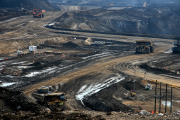This week, 15,000 people and 60 heads of state and youth like myself from 170 countries are meeting in Copenhagen to discuss the urgent need for a new UN climate agreement.
Climate change is the biggest challenge humanity has ever faced and yet to most Canadians the current and potential impacts feel far away. We commonly associate the impacts of climate change with the decreasing polar bear numbers, an iceless Arctic, or ravaging storms and floods in southern regions. What many Canadians don't realize is that climate change is having a large impact in Canada right now.
I am a Dene youth from the small town of Fort Good Hope, Northwest Territories. I am attending the UN Summit on Climate Change in Copenhagen to communicate the concerns that my family, my people, and my culture are confronted with every single day.
Climate change is the largest threat Dene culture has ever faced. We are experiencing impacts that are threatening not only our culture, but our survival. Hunting is sacred in Dene culture and yet our caribou herds are declining. Water levels are unpredictable. Ice is thin and unsafe for travel. And these are just some of the current effects. In the future our land will be completely changed, and may be so contaminated we are unable to eat even the invasive species that will eventually replace our caribou.
The reality is that climate change is having tangible and devastating consequences in a part of Canada that few people experience or see. We are experiencing the impacts now, and they are getting worse every year.
And Dene people are not alone here.
I never fully understood the word "solidarity" until I learned about the climate-related plights of other indigenous and impoverished populations. Billions of people on this planet are affected by climate change. Droughts, hurricanes, and rising sea levels are examples of the life-destroying impacts faced by billions of people throughout the next century. We must make a choice to help these people or let them die. Just as we must choose to either help my people, or let our culture die. I join the chorus of the world's most marginalized and vulnerable people, all faced with the prospect of loss of home and loss of culture.
Traditional Dene skills are passed down from father to son, mother to daughter, from generation to generation. Hunting is so important to us that my great grandfather Chief T'selehye and others signed treaties to protect our rights to hunt.
Along with a whole generation of Dene youth, I am now tasked with preserving and passing on our hunting culture. This is great deal of responsibility. For years we have struggled to preserve our culture while modern influences try to slap it out of our hands. Television, internet, drugs and alcohol, wage economies, mandatory education, I can't say all these are bad, but they represent a massive shift in lifestyle that Dene people have experienced, and holding on to our culture through these tumultuous times has been difficult.
But in spite of all those things I used to think the fate of the culture of the Dene people was in our hands to save. Today, most of us participate in the wage economy and yes, most Dene people are now Roman Catholic. But no, our culture is not lost yet and its preservation is not a lost cause. The deck has been stacked against us in the past, but all these obstacles to cultural preservation and proliferation are within our control to conquer.
Well, that is how I used to think, when it seemed our cultural fate was still in our hands.
Climate change is a problem the Dene cannot solve on our own. We need the help of Canada and the world. Despite federal foot-dragging, I am a hopeful that the UN summit in Copenhagen this week provides the opportunity for dialogue, for the exchange of our stories and personal experiences, so that we as a nation can begin to walk the talk and close the gap between rhetoric and action. The solutions are clear and science-based - we need pollution reduction targets in place immediately. The economic analysis is equally as clear; Canada can take the necessary action on climate change while growing its economy.
I hope this is not where my story ends. A proud Dene man on a mission to share the stories of climate change impacts with an international audience.
Canada can take action, and whether we do or not is a moral question.
Daniel T'Seleie is a Dene, originally from Fort Good Hope, now living in Yellowknife NWT. He is on the Canadian Youth Delegation participating in the U.N. Climate Summit in Copenhagen.




